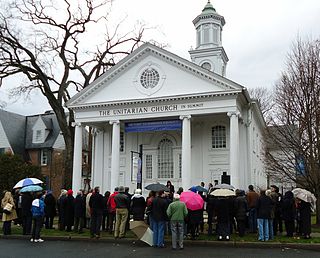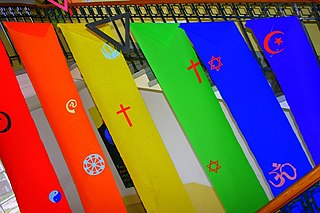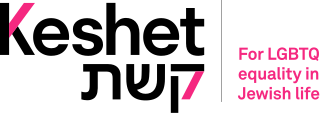The subject of homosexuality and Judaism dates back to the Torah. The book of Vayikra (Leviticus) is traditionally regarded as classifying sexual intercourse between males as a to'eivah that can be subject to capital punishment by the current Sanhedrin under halakha.

The views of the various different religions and religious believers regarding human sexuality range widely among and within them, from giving sex and sexuality a rather negative connotation to believing that sex is the highest expression of the divine. Some religions distinguish between human sexual activities that are practised for biological reproduction and those practised only for sexual pleasure in evaluating relative morality.
Keshet Rabbis is an organization of Conservative/Masorti rabbis, cofounded in 2003 by Menachem Creditor, which holds that gay, lesbian, bisexual and transgender Jews should be embraced as full, open members of all Conservative congregations and institutions. Based on its understanding of Jewish sources and Jewish values, it asserts that LGBT Jews may fully participate in community life and achieve positions of professional and lay leadership.

Unitarian Universalism, as practiced by the Unitarian Universalist Association (UUA), and the Canadian Unitarian Council (CUC), is a non-Creedal and Liberal theological tradition and an LGBTQ affirming denomination.

Lesbian, gay, bisexual, transgender and queer (LGBTQ+)-affirming religious groups are religious groups that welcome LGBT people as their members, do not consider homosexuality as a sin or negative, and affirm LGBT rights and relationships. They include entire religious denominations, as well as individual congregations and places of worship. Some groups are mainly composed of non-LGBTQ+ members and they also have specific programs to welcome LGBTQ+ people into them, while other groups are mainly composed of LGBTQ+ members.

Keshet is a national grassroots organization with offices in Boston, New York, and the San Francisco Bay Area that works for the full equality and inclusion of lesbian, gay, bisexual, transgender, and queer Jews in Jewish life. Led and supported by LGBTQ Jews and straight allies, Keshet offers resources, training, and technical assistance to create inclusive Jewish communities nationwide. Keshet produced the documentary Hineini: Coming Out in a Jewish High School and companion curriculum.
Sexual orientation has been a pivotal issue for Conservative Judaism since the 1980s. A major Jewish denomination in the U.S., Conservative Judaism has wrestled with homosexuality and bisexuality as a matter of Jewish law and institutional policy. As with other branches of Judaism debating the acceptability of sexual orientations other than heterosexuality, Conservative Jews faced both long-standing, rabbinic prohibitions on homosexual conduct as well as increasing demands for change in the movement's policies toward gays, bisexuals, and lesbians. Previously, the Conservative movement had changed its policies toward women, for example, by allowing the ordination of women as rabbis in 1983. Similarly, the Conservative leadership has been asked to stop discriminating against gay, bisexual, and lesbian people. This goal has been partially completed with the approval of the ordination of gay, bisexual, and lesbian rabbis in 2006 and of same-sex marriage ceremonies under Jewish law in 2012; However, the Conservative decision did not call same-sex marriages kiddushin, the traditional Jewish legal term for marriage, because that act of consecration is nonegalitarian and gender-specific. In the traditional kiddushin ceremony, a pair of blessings is recited and the bridegroom gives his bride a ring, proclaiming that he is marrying his bride “according to the laws of Moses and Israel.”.
The relationship between transgender people and religion varies widely around the world. Religions range from condemning any gender variance to honoring transgender people as religious leaders. Views within a single religion can vary considerably, as can views between different faiths.

The relationship between religion and lesbian, gay, bisexual, and transgender (LGBT) people can vary greatly across time and place, within and between different religions and sects, and regarding different forms of homosexuality, bisexuality, non-binary, and transgender identities. More generally, the relationship between religion and sexuality ranges widely among and within them, from giving sex and sexuality a rather negative connotation to believing that sex is the highest expression of the divine.
The first openly lesbian, gay, bisexual, and transgender clergy in Judaism were ordained as rabbis and/or cantors in the second half of the 20th century.
Same-sex marriage in Judaism has been a subject of debate within Jewish denominations. The traditional view among Jews is to regard same-sex relationships as categorically forbidden by the Torah. This remains the current view of Orthodox Judaism.
Bet Mishpachah is a non-denominational Jewish egalitarian worshiping community and congregation that supports a synagogue, located in the Dupont Circle area of Washington, D.C., in the United States.

Congregation Beit Simchat Torah ("CBST") is a non-denominational progressive Jewish synagogue located at 130 West 30th Street, in the Midtown Manhattan neighborhood of New York City, New York, United States.

Sharon Kleinbaum is an American rabbi who serves as spiritual leader of New York City's Congregation Beit Simchat Torah. She has been an active campaigner for human rights and civil marriage for gay couples.
This is a timeline of LGBT Jewish history, which consists of events at the intersection of Judaism and queer people.

LGBT culture in Baltimore, Maryland is an important part of the culture of Baltimore, as well as being a focal point for the wider LGBT community in the Baltimore metropolitan area. Mount Vernon, known as Baltimore's gay village, is the central hub of the city's lesbian, gay, bisexual, and transgender communities.
Beit Haverim is a French organization for LGBT Jews.






